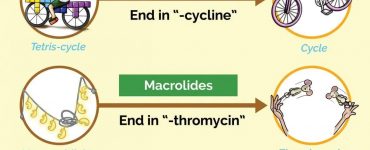Not only do medical students need to retain everything they learn during medical school, they also need to retain their knowledge throughout residency and the rest of their professional careers. With so much information to learn, digest, and commit to memory, studying in medical school requires a large amount of dedication and hard work. Uncover how to better retain information to succeed in school and beyond with the 4 tools below.
We’ve compiled the best ways to retain information when studying in medical school! Here’s how they work and can be used with Picmonic’s visual learning platform for medical students.
1. Mnemonic Memory Devices
Medical mnemonics are one of the best tools to improve memory when studying. The medical mnemonics you’re likely already familiar with are acronyms like the SOAP technique or the ABCs of CPR. However, mnemonic devices are not limited to acronyms. They can be any memory aid like an image, rhyme, poem, song, or chart.
Mnemonic techniques are effective for all kinds of learners. If you’re a visual learner, you may benefit from Picmonic’s vast library of medical mnemonics! Picmonics are memorable since our brains prioritize memorizing images, but we’ll talk more about that later.

2. Spaced Repetition Quizzes
Spaced repetition is integral to every medical student’s study routine; it’s when you revisit medical information in spaced intervals to retain and recall it. If you think about it, spaced repetition is the opposite of cramming. Rather than trying to take in a lot of information at once, spaced repetition allows you to review difficult topics in a spaced yet frequent manner to help you avoid the overconsumption of information and forgetting it altogether.
Trying to deduce when you should revisit medical information can get tricky. Luckily, Picmonic has a smart software algorithm that re-exposes you to medical information via a daily spaced repetition quiz before you forget it.
3. Retrieval Practice
Retrieval practice is much needed when you’re studying medical facts and information. After all, practice makes perfect! Quizzes, practice questions or exams, and flashcards are all great retrieval methods. Picmonic features built-in quizzing for convenient retrieval practice which is helpful for medical students on the go.
Retrieval practice isn’t limited to practice tests and quizzes, though. Spice it up and try the “brain dump” method where you write everything you know about a medical topic on a flashcard or piece of paper.
4. Visual Learning

Here’s how to improve memory when studying—bring out the pictures! Visual learning is an evidence-based learning method. According to the picture-superiority effect, images are more memorable than words and communicate with the brain faster than text or audio. Our brains process images and associate them with key concepts which enhances overall memory retention and recall.
That’s why Picmonic is the best way to retain information when studying in medical school; picture mnemonics speak a thousand words.
5 Med School Memorization Tricks for Studying
Try these memorization methods for fun, impactful ways to study and retain information long-term.
1. Create a Memory Palace
Sounds luxurious, doesn’t it? A memory palace, or the Method of Loci, is a technique where you visualize familiar spaces to remember information. It’s extremely effective for medical students who are struggling with a difficult topic.
First, visualize a place you’re familiar with. It can be a place you visit frequently like your home or a place you have a fond memory of (fictional spaces count too). Then, you’ll imagine images that represent the information you want to remember and visualize them in that place. How you “create” and “place” these images in your visualized space is important as you’ll envision yourself walking through it.
The better the images, the better your memory palace. Images can be big, creative, graphic, funny, or just plain weird. Still, be sure it ties into the medical information you need to remember.
2. Use Flashcards
When you’re learning how to study to retain information, you may get sick of the word “flashcards”. However, flashcards are a tried and true method, so you can never go wrong with them. Whether you prefer a stack of physical flashcards or digital tools like Anki, flashcards are great for quick, repetitive review and memorization.
Did you know Picmonic has a free Anki add-on?
3. Review and Rewrite
This one’s pretty straightforward, but it is one of the most underrated memory tricks for studying! After you’ve skimmed through notes, lectures, or assigned readings, put them aside and rewrite what you remember. You can word dump on a piece of paper or use keywords and bullet points to create a flow chart to cement concepts and revisit them later.
4. Teach it
Attention, class is now in session! Try creating a short presentation or lecture on what medical fact you want to nail and present it. This memorization method helps you consolidate information, communicate it effectively, and remember it for later. It can be done solo, but we highly recommend trying it with your study group.

While study groups aren’t for everyone, they can help you get valuable feedback to identify knowledge gaps. Different folks can also expose you to different study approaches, so don’t knock it until you try it.
5. Tell a Story
Let your imagination run wild. Traditional memorization methods can get boring, especially with the amount of information you need to recall in medical school. Creating a story or scenario with a medical fact or approach makes it more memorable. Link facts together to create a narrative and just get creative. This works well with case studies, patient histories, or other medical processes.
Picmonic’s mnemonic generator allows you to generate your own mnemonics for learning fun! All you have to do is explore Picmonic’s library of facts and characters, link relevant media, and save it for later.













